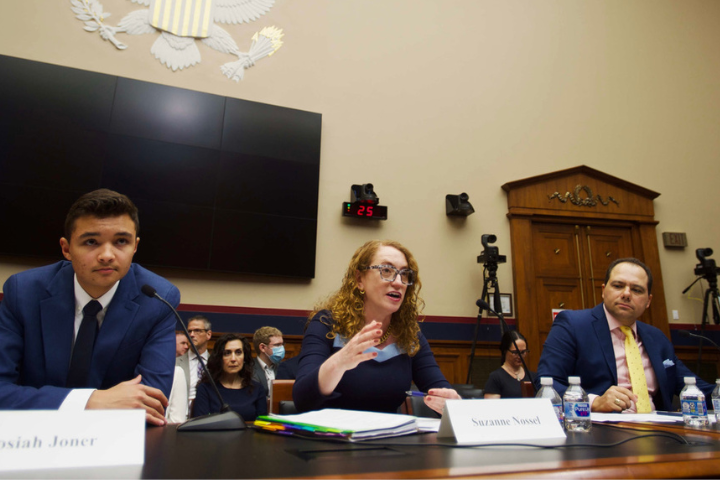PEN America’s Florida Director, Katie Blankenship, has submitted a comment to the Florida Board of Governors requesting reconsideration of Senate Bill 266, which among other restrictions prohibits universities from engaging in “political or social activism” and bars diversity, equity, or inclusion (DEI) programs that attempt to “equalize or increase outcomes, participation or representation as compared to other individuals or groups.” Blankenship writes that SB 266 is “contrary to our core First Amendment liberties and values of academic freedom.” The bill’s overly vague, broad, and punitive definitions of “political or social activism” will have a profound chilling effect on colleges and universities, creating an environment that “impoverishes students’ understanding of the world around them, leaving them unprepared for citizenship in a pluralistic and democratic society.” The bill’s definition of DEI is similarly vague and overbroad and evinces a “hostile attitude toward any on-campus program that seeks to increase diversity of representation or perspective at Florida’s institutes of higher education.”
PEN America’s comments to the Florida Board of Governors re: the enforcement of Senate Bill 266 (submitted by Katie Blankenship, 11/23/23)
As director of PEN America’s Florida office, a national free expression organization that stands at the intersection of literature and human rights, I write to criticize and request reconsideration of the proposed Board of Governors Regulation 9.016 Prohibited Expenditures (the “regulation”) which seek to enforce Senate Bill 266 (“SB 266”). The overly vague, broad, and punitive definitions contained in these regulations go far beyond the requirements of the law; they will chill speech of faculty and students and are primed for over-application and abuse.
SB 266 prohibits universities from engaging in “political or social activism,” terms not defined in statute. The proposed regulation offers the following definition: “Any activity organized with a purpose of effecting or preventing change to a government policy, action, or function, or any activity intended to achieve a desired result related to social issues.” The Board of Governors defines social issues as “topics that polarize or divide society among political, ideological, moral, or religious beliefs.”
This definition is too broad and vague to be fairly and equitably applied. It is unclear who would be in a position to decide what ideas or topics are polarizing or divisive and by what standards, leaving open the possibility of gross over-application. An environmental sciences dean celebrating a new environmentally sustainable building; health science faculty or a student-led organization promoting women’s health and access to family planning (the impact of the regulation on student-led organizations is also vague and needs to be clarified); a criminal justice professor applauding efforts to lower incarceration rates; a hospitality program dean discussing the need to approach wedding planning with all types of couples in mind – all could be seen as “intended to achieve a desired result related to social issues.” Such a broad definition could cast a pall of orthodoxy over the institution, creating a pervasive climate of fear on campus and chilling speech on a broad array of issues of societal importance.
Further, fostering diverse perspectives is essential to universities’ core values of incubating ideas and preparing students to become informed and engaged citizens. To achieve these goals, it is critical that students and faculty are able to engage in robust discussion and consideration of innumerable topics commonly addressed on campus, both inside and outside of the classroom, which could be said to “polarize” or “divide” society. To prohibit activity related to such topics will create an environment that impoverishes students’ understanding of the world around them, leaving them unprepared for citizenship in a pluralistic and democratic society.
Such prohibitions are contrary to our core First Amendment liberties and values of academic freedom. As the U.S. Supreme Court reminds us, the “Nation’s future depends upon leaders trained through wide exposure to that robust exchange of ideas which discovers truth out of a ‘multitude of tongues, (rather) than through any kind of authoritative selection.’” Keyishian v. Bd. of Regents of Univ. of State of N. Y., 385 U.S. 589, 603 (1967) (internal citations omitted).
Similarly, the Board of Governors’ definition of “diversity, equity, or inclusion” (“DEI”) as “any program, campus activity, or policy that classifies individuals on the basis of race, color, sex, national origin, gender identity, or sexual orientation and promotes differential or preferential treatment of individuals on the basis of such classification” is vague, overly broad, and prone to overapplication. Depending on interpretation, this language could prohibit a formal debate on racial issues, an event featuring proponents and opponents of abortion care, or formal recognition of a Black Student Union on campus.
The prohibition of DEI programs that attempt to “equalize or increase outcomes, participation or representation as compared to other individuals or groups” evinces a hostile attitude toward any on-campus program that seeks to increase diversity of representation or perspective at Florida’s institutes of higher education. The regulations as written suggest that fair and even evaluations of what programs fit the criteria are unlikely, and that critical on-campus organizations and student initiatives, such as any number of student union groups and efforts to increase opportunities for women, people of color, and LGBTQ+ students, will be specifically curtailed. Targeting such efforts again undermines our core values of free speech and expression.
Furthermore, the Board of Governors must clarify that the provisions of the bill that stipulate that government funds cannot be used for any curriculum or campus activities or programs that violate Florida Statute §1000.05 do not include the provisions in §1000.05(4)(a) in regards to classroom instruction or curriculum, as those provisions are currently enjoined.
I urge the Board of Governors to rework this policy to avoid broad language that chills a vast array of campus speech, and to instead focus more narrowly on the provisions actually required by the statute so as to limit as much as possible the harm to free expression and academic freedom on Florida’s university campuses.
Sincerely,
Katie Blankenship
Florida Director
PEN America



